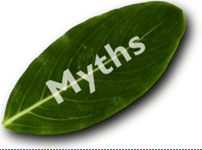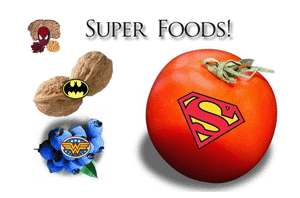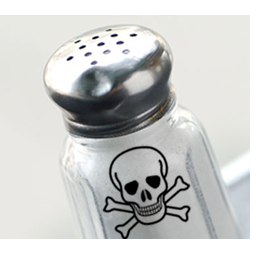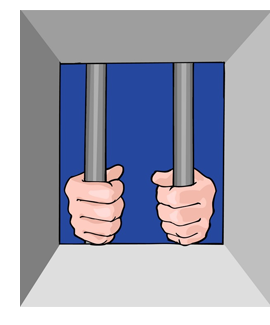
Lower blood pressure without drugs? Back in the “good old days” most people would hardly have given it a thought. They just took the medications prescribed by their doctors and got on with their lives. Side effects and unknown risks were just a necessary evil: “better than the alternative” in other words.
But people nowadays are increasingly questioning their doctors and looking for alternative ways to reduce their blood pressure without medication. Hypertension drugs are a particularly nasty bunch in terms of side effects and unforeseen health risks. Some experts believe that the drugs kill as many people as the condition they are prescribed to treat.
So it’s not surprising that there’s a huge market for natural blood pressure remedies and that these are a hotly debated topic in health forums. This creates a rich field for the spread of misinformation. So it’s not surprising that a number of myths have developed around the issue of hypertension and natural remedies for it. Here are four of the most common:
The medicinal effects of various foods have a long history and are very attractive to people looking for easy, natural solutions to health problems. The list of foods claimed to lower blood pressure is long and varied and includes apple cider vinegar, chocolate, grapes, grapefruit, celery root, bananas, beetroot juice and many more.

The claims are usually based on anecdotal evidence, although some of them have indeed shown some ability to lower blood pressure in testing. Beetroot juice is a recent example that has been heavily publicized by the media. But when studied over time and in detail the results inevitably look less exciting.
In some cases the reductions obtained are short-lived while in others the expense or volumes of the food required are insensible. Whatever the shortcomings, these foods simply fail to hold up as practical blood pressure remedies. Just imagine the “miracle menu” that would emerge if such superfoods really worked to reduce high blood pressure!
Think “diet,” not “foods” for lower blood pressure!
The one thing, nutrition-wise, that is a genuine route to healthy blood pressure is your diet, as opposed to specific foods. The DASH diet, in fact, as reflected by its name (Diet Approaches To Stop Hypertension) is the “official” guide to eating for lower blood pressure.
Even DASH, however, focuses too much on specific foods and food groups, emphasizing “good” ones over “bad” ones. But the most sensible dietary approach to stopping hypertension is much simpler: eat a varied and balanced diet rich in whole, natural foods.
There are no “good” or “bad” foods; they all contribute to our health when consumed in the right balance. But this applies to “real” foods. The one type of food that’s sure to throw your body out of balance is processed.
Many processed foods that you have to be careful with are obvious ones containing high levels of sugar, fat or salt. But watch out too for processed foods often promoted under the guise of “healthy substitutes”. These include margarine, egg and dairy substitutes, and many low-fat products that replace natural fat and oils with starchy or unnatural ingredients. The real thing, in sensible quantity, is nearly always healthier.
 More than any
other food, salt has
been demonized for
raising blood pressure. Of course, salt or sodium can be harmful when
consumed
in excess, like many people do when they thoughtlessly sprinkle it on
every
plate of food. But this is true of any substance we consume. One of the
basic
tenets of toxicology is that “the dose makes the
poison”.
More than any
other food, salt has
been demonized for
raising blood pressure. Of course, salt or sodium can be harmful when
consumed
in excess, like many people do when they thoughtlessly sprinkle it on
every
plate of food. But this is true of any substance we consume. One of the
basic
tenets of toxicology is that “the dose makes the
poison”.
But the salt prohibition goes too far when it’s used to promote overpriced “low or no salt” foods and strange “salt substitutes” that are unhealthy in their own right. Sodium, along with magnesium, calcium and potassium, plays an important role in regulating blood pressure. A healthy level of sodium is as vital as the others. But when the levels of these minerals get out of balance it throws our blood chemistry out of kilter, thus raising blood pressure.
The problem is that processed foods are often high in sodium and low in other minerals. So it’s not sodium, per se, that’s at fault for raising blood pressure but rather a mineral imbalance resulting from a poor diet high in processed foods!
The remedy is, again, a diet low in processed foods and high in whole, natural foods with a healthy balance of minerals. With this type of diet there is rarely a need for extreme low-sodium products and salt-substitutes. Used sparingly, salt adds a bit of zest to bland food and is an important part of a healthy diet.
This common myth does a real disservice by discouraging people from making healthy changes in their lifestyle. What’s more, it reinforces a common belief among doctors that patients will not follow through with lifestyle improvements and thus increases the number of “knee jerk” prescriptions.
In fact, losing large amounts of weight is one of the only major lifestyle modifications that can justifiably be called slow going. Of course the time and effort invested is more than worth the wait. While a large change in weight could take a year or more, the benefits are for life.
But just about everything else – quitting smoking, drinking less alcohol, eating better, sleeping longer, relaxing – can all be achieved quickly with equally fast effects on blood pressure. Drops in blood pressure and other circulatory improvements, for example, start within hours of smoking one’s last cigarette. This may be one of the hardest addictions to beat but most experts agree that going cold turkey with 100% resolve is the most successful way to do it.
Hypertension is often related to stress but drops quickly and significantly when you are relaxed. Effective stress management and plenty of relaxation, like most lifestyle changes, offer an immediate payoff.
Exercise is a challenge for many people, especially when the distance between their present sad state and fitness can seem so vast. But researchers are able to measure important physiological changes from the very first instance of sustained exercise. These changes include lower blood pressure (after the initial spike goes down!)
Slow breathing is an easier lifestyle technique that has a remarkable effect on high blood pressure. Blood pressure starts to fall with the first slow and relaxed breath and has been shown to drop by 36 points systolic and 20 points diastolic or more after 15 minutes of slow breathing.
Even more surprisingly, the benefits of slow breathing are cumulative and often lead to both significant and lasting blood pressure reductions in just a few short weeks.
When something as non-intensive as slow breathing can offer near instant benefits to your blood pressure there’s no excuse not to work with it and other lifestyle changes. Go on and prove your doctor wrong!

This is another dead-end myth that does real harm by preventing you from improving your quality of life. Many doctors even tell you this, frightening the wits out of you and making sure you’re hooked for life. “It’s for your own good,” of course!
It’s important to stress that you should never change your dosage or stop taking any blood pressure medication without medical supervision. Our bodies acclimate themselves to the drugs we take and any sudden drop in their levels has the potential for a disastrous rebound effect.
Some people with severe and chronic hypertension complicated by other health problems will always require medication. For them it truly is “better than the alternative”.
But this hasn’t stopped thousands of other people from achieving a gradual and controlled withdrawal from blood pressure drugs with the help of lifestyle changes and other natural methods. If you are convinced that you can do this but your doctor is unsupportive you owe it to yourself to get a second opinion.
The responses to these four myths form a simple strategy:
Eat a healthy, common sense diet…
Don’t be misled by either fad or taboo foods…
Improve your lifestyle, starting, if necessary, with easy but fast-acting methods like slow breathing…
And avoid, reduce or even eliminate blood pressure drugs and their side effects.
Click here to discover an easy, lifestyle technique that can bring you lower blood pressure... with fast and reliable results.